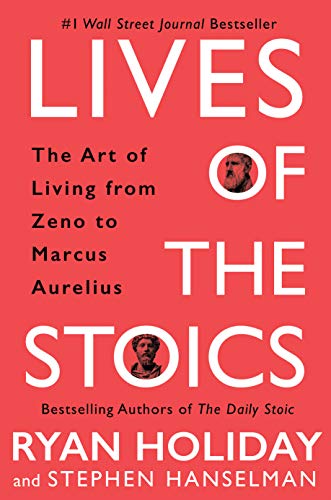
Lives of the Stoics: The Art of Living from Zeno to Marcus Aurelius

It’s a reminder all these years later for everyone considering their legacy. It’s not what you say that lives on after your time; it’s not what you write or even what you build. It’s the example that you set. It’s the things that you live by.
Stephen Hanselman • Lives of the Stoics: The Art of Living from Zeno to Marcus Aurelius
His job, Cato believed, in a tradition begun by Diogenes, was to serve the public good. Not himself. Not expediency. Not his family. But the nation. That’s what real philosophy was about, whether his skeptical great-grandfather or fame-chasing friend Cicero understood it or not.
Stephen Hanselman • Lives of the Stoics: The Art of Living from Zeno to Marcus Aurelius
“Well-being is realized by small steps,” he would say, looking back, “but is truly no small thing.”
Stephen Hanselman • Lives of the Stoics: The Art of Living from Zeno to Marcus Aurelius
Urgently, the skills of the philosopher—reason, virtue, logic, ethics—were needed outside the Stoa, even outside the agora. To solve problems. To build frameworks and write laws. To guide magistrates. To forge compromises. To persuade and to hold back the passions of the mob. To settle disputes between cities. Diogenes
Stephen Hanselman • Lives of the Stoics: The Art of Living from Zeno to Marcus Aurelius
Posidonius worked and lived in many places in his long life—Syria, Athens, Rome, and Rhodes—and he traveled almost the entirety of the known world. He wrote many books. He advised many powerful men. He was one of the smartest men of the ancient world—a small part of a cosmic universe, by his own admission, but an impressive contributor nonetheless.
Stephen Hanselman • Lives of the Stoics: The Art of Living from Zeno to Marcus Aurelius
That Stoic idea of oikeiosis—that we share something and our interests are naturally connected to those of our fellow humans—was as pressing in the ancient world as it is today.
Stephen Hanselman • Lives of the Stoics: The Art of Living from Zeno to Marcus Aurelius
Panaetius argues that if we are to live an ethical life and choose appropriate actions, we must find a way to balance: the roles and duties common to us all as human beings; the roles and duties unique to our individual daimon, or personal genius/calling; the roles and duties assigned to us by the chance of our social station (family and profession
... See moreStephen Hanselman • Lives of the Stoics: The Art of Living from Zeno to Marcus Aurelius
Aristo had seemed to think that philosophy was for the wise man exclusively, for the individual’s self-actualization. His Stoicism worked well in the classroom, and raised interesting debates, but it would not work in the world. Diogenes saw Stoicism differently. It was a way of thinking—as well as a set of rules—for serving the common good, for se
... See moreStephen Hanselman • Lives of the Stoics: The Art of Living from Zeno to Marcus Aurelius
To the Greeks, each of us had a daimon, an inner genius or guiding purpose that is connected to the universal nature. Those who live by keeping the individual and universal natures in agreement are happy, Zeno said, and those who don’t are not.